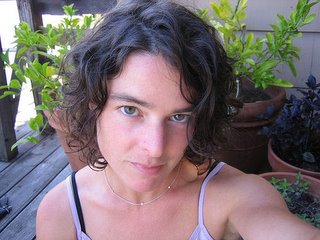Chapter 10: Everything is Illuminated
At first, assuming that the Jewish Cemetery would be somewhat off to the side, we walked past the big entry gate, past the Western border, past a long, tall fence (peeking through the crevices to see if there were any gravestones behind it). To our left, Axel pointed out a train in the distance. To our right, a small, dirt road cut between large cinder-block apartment houses. We took the dirt road, up a short hill, past dogs running around small yards filled with building materials, and found the cemetery wall. More dogs came to greet us.
We had a hunch that the Jewish graves would be at the farthest side of the cemetery: along the northern border, but whether it would be east or west, neither of us could guess. There was a small niche in the wall, a tiny footpath of tamped down snow. We edged in, squeezing past grave fences, trying to see the edge of the cemetery. We walked and walked along these tiny paths. Eventually we came to a much wider foot path and discovered a grid of these wider paths. But just rows and rows of crosses adorning graves stones and sites. At one broad crossing, Mychal and I decided to split up: he'd go North-West, Axel and I would go North-East.
Snow and graves were all we could see in any direction; slightly disoriented, as if we were in a forest, I tried to remember flowers and names so that I could find my way back to our parting spot. Neither of us had a watch, or a phone.
I asked a man, meticulously wiping the snow off a large marble mausoleum with a cloth, whether he knew if there was a Jewish cemetery here. Yes, yes, he said, and told me to go all the way to the top edge, and then to the right. Thanking him, I walked off with Axel on my back. The wide, packed down path became, briefly, a road with clear spots, then more packed snow paths, then tiny foot path through graves, and then untrampled snow. We walked, snow gathering in my shoes, slinking up to my knees. The sun emerged, I took off my hat, my gloves, unzipped my coat. Dogs barked in the distance, graves surrounded us. I began to despair that I wouldn't find the Jewish graves, nor Mychal, for that matter.
I charted north-west through the snowy clear spaces, saw a star--no it's just a Soviet Army star, no! It's actually a Star of David. And lo and behold: here I was amidst hundreds of Jewish grave stones. By this point, I had begun to call Mychal's name; all I heard in return were the barking dogs getting nearer. Axel, on my back, asked whether these were graves too. And these? Yes, and I read the names, read the dates. We wandered up and down a few rows, crunching through the clean snow. A few more rows, and I still couldn't see the end of the grave sites.
Still calling Mychal's name, more frequently now, Axel chiming in, we turned back and retraced our steps. Dog footprints accompanied our previous tracks, bloody marks spelled out a skirmish. I carefully placed my feet next to my earlier tracks, marking a round-trip just in case Mychal stumbled across them (was I a girl scout?!). We arrived back at the paved road, past the now clean marble mausoleum, and there was Mychal, heading in our direction.






